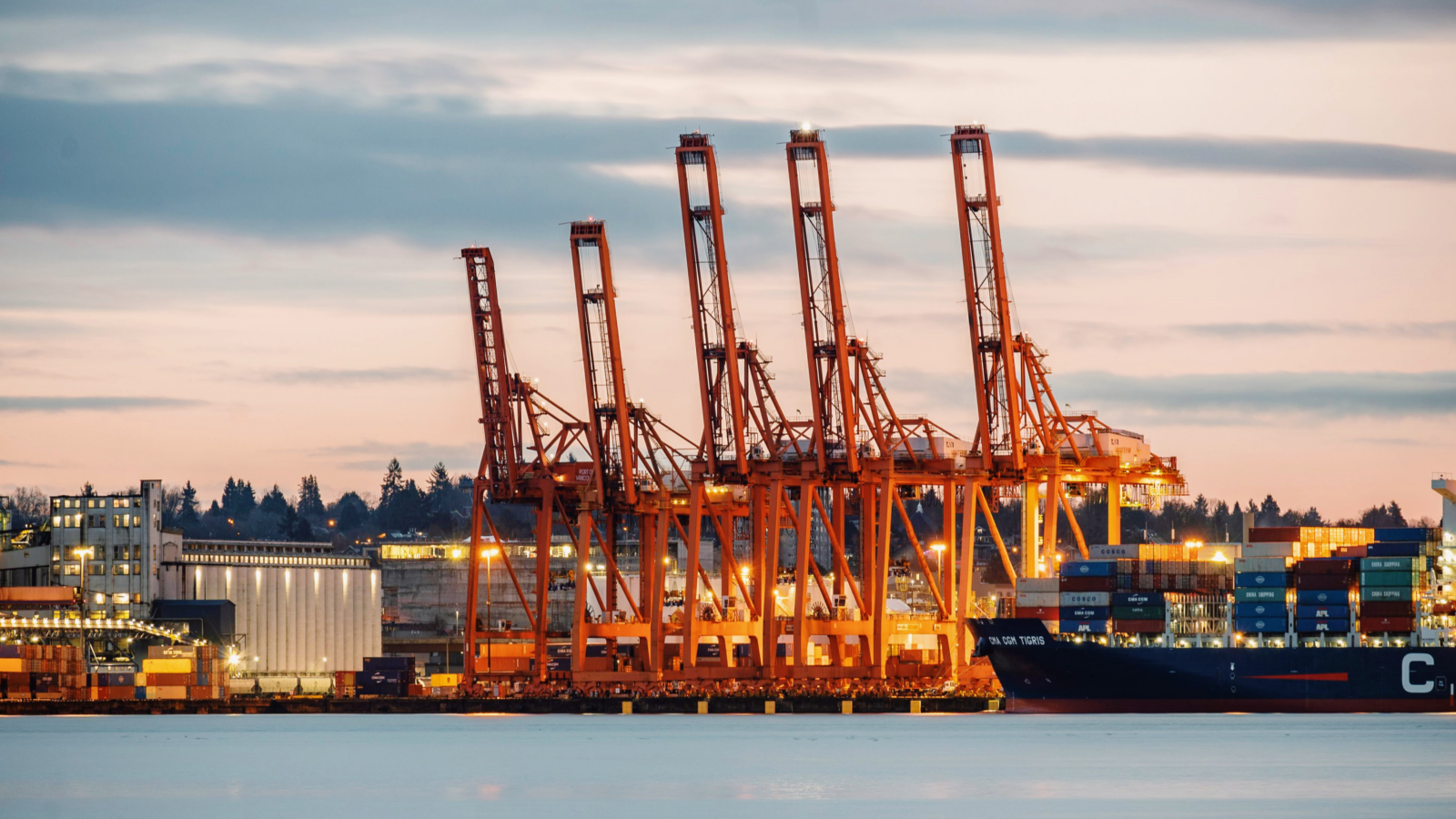Good morning.
AI may not be sentient, but it sure is moody.
In an apparently widespread bug this week, ChatGPT had a moment, responding to questions and prompts from users with long-winded, occasionally bilingual, often nonsensical, and sometimes creepy answers (one user, for instance, reported a response in which the chatbot suggested it was in the room with them). Add intermittent explosive disorder to the things about AI that scare us.
Biden Executive Order Aims to Strengthen US Port Cybersecurity

The Internet of Things is like Berlin in the Cold War: filthy with spies. Or at least that’s what’s spooking the White House.
On Wednesday, President Joe Biden signed an executive order allocating $20 billion to invest in the domestic production of cargo cranes, amid fears that China-built equipment currently employed at major US ports could be hacked or tampered with.
Settle it in Port
The threat posed by China-made shipping infrastructure has been a major blinking light on the national security community’s radar since at least a year ago, according to a Wall Street Journal investigation published last March featuring several counter-intelligence officials voicing grave concerns. Red flags have been furiously waved over the ubiquity of ship-to-shore cranes produced by state-owned Chinese company ZPMC, which are in use at 80% of US ports, officials say. The cranes are designed for remote operation and also feature sophisticated sensor technology that can track the origin or destination of cargo, possibly exposing valuable information.
Officials, it should be noted, have declined to say whether there’s any evidence of nefarious or suspicious activity at any US port. But if legislators fear Beijing’s theoretical grip on TikTok, you best believe there are concerns that China could compromise or control critical supply chains. Which is why Wednesday’s executive order takes a two-pronged approach to fortifying US ports against cyber attacks:
- Among the actions is a US Coast Guard directive to mandate digital-security standards at strategic ports, as well as implementing cybersecurity standards on all computer networks within US ports.
- The executive order also includes $20 billion — tapped from 2021’s $1.2 trillion bipartisan infrastructure bill as well as from the 2022 Inflation Reduction Act — to improve port security and bolster domestic crane production, with a US subsidiary of Japan-based Mitsui granted funds to produce the first domestically built cranes in 30 years.
“We felt there was real strategic risk here,” Anne Neuberger, US deputy national security adviser for cyber and emerging technology, told the WSJ. “These cranes, because they are essentially moving the large-scale containers in and out of port, if they were encrypted in a criminal attack, or rented or operated by an adversary, that could have real impact on our economy’s movement of goods and our military’s movement of goods through ports.”
FBI-Spy a Threat: The executive order can’t come soon enough for FBI Director Christopher Wray, who warned at the Munich Security Conference last weekend that Chinese cyber espionage had reached a “fever pitch.” Earlier this month, the FBI, the National Security Agency, and the Cybersecurity and Infrastructure Security Agency released an intelligence report warning that China-backed hacker network Volt Typhoon has had access to some critical infrastructure for “at least five years.” In other words: there’s never a bad time to listen to your IT guy and finally set up two-factor authorization on your email.
Locking in 5% Risks Missing Out on 14.6%, 16.4%, and 17.6%

Thanks to last year’s interest rate hikes, investors can finally get rewarded for parking their excess cash. But for those who are really looking to put their money to work, there’s something else you’ll want to consider: opportunity.
Like the opportunity to invest with Masterworks, an award-winning platform for investing in blue-chip art. So far, each of its 20 exits have delivered a profit, and Masterworks investors have realized returns of 14.6%, 16.4%, and 17.6% among many others.
With a track record like that, Masterworks’ offerings can sell out in minutes. However, Daily Upside readers can skip the waitlist to join and claim their free account, with this exclusive link.
Shein and Temu’s Fast-Fashion Rivalry is Rocking the Air Freight Industry
They didn’t mention that in their Super Bowl ads.
Rival e-commerce companies Shein and Temu are upending the air freight business as they race to ship products directly to international customers via plane, leading to a bidding war that’s quickly making overall services more unaffordable, sources told Reuters.
Too Fast Too Fashion
Temu and Shein are the new poster children of fast fashion, and they’ve been locked in a race to the bottom. When Shein dumped some China-based suppliers that didn’t live up to its certification standards, Temu was ready and waiting to scoop them up for itself. And besides fighting for the hearts of American consumers — something Temu spent millions on in the form of three Super Bowl ads — the two e-commerce companies have locked antlers in court over allegations of intimidating business partners.
Both Temu and Shein rely on seriously low prices to reel in customers, but they’re also chasing an Amazon-esque fast-shipping model, which means air freighting products directly from China to front porches in the US. That logistics model and their respective massive growth are hardly ideal for other companies fighting to get their products shipped by plane:
- Companies are seeking workarounds because many shipping companies are avoiding the Red Sea for fear of attacks from Yemeni rebels. Normally, that would mean leaning on air freight, but Temu, Shein, and other Chinese e-commerce ventures including TikTok Shop are taking up all the room.
- “When the Suez Canal (crisis) hit, there was no capacity to be bought, because e-commerce has bought it all,” one anonymous air cargo carrier executive told Reuters.
One industry executive told Reuters the companies’ impact is even greater than the Suez Canal crisis. “The biggest trend impacting air freight right now is not the Red Sea, it’s Chinese e-commerce companies like Shein or Temu,” Basile Ricard, director of Greater China operations at freight forwarder Bollore Logistics, said.
Slowing Their Roll: Unsurprisingly, this frantic pace of air-shipping $5 shorts isn’t great for either Mother Earth or the companies’ bottom line. “Based on what we have seen, this model of (airborne) e-commerce is not sustainable, neither from a profit or environmental standpoint,” Guillermo Ochovo, director at Cargo Facts Consulting, told Reuters. Sooner or later, these companies will have to wean themselves off air freight, and Reuters reported that Shein has begun storing goods in US warehouses.
Reddit Plans to Turn its Meme-Stock Powers on Itself
r/Goldrush!
Social media company Reddit plans to share the (opportunity for) wealth in its expected IPO this spring, with sources telling The Wall Street Journal that the company intends to reserve some to-be-determined amount of shares so that 75,000 of its most loyal users can buy its stock before it goes public.
For the Fans
This isn’t exactly the traditional IPO scenario, which usually sees most new shares go to large asset managers that provide valuable price stability by holding the stock longer and incrementally selling it off to the public.
But it’s also not the first time it’s happened: most notably, in 2021, stock-trading platform Robinhood, the meme-stock yin to Reddit’s yang sold a large piece of its IPO to individual users. Unfortunately, going off the standard playbook resulted in the stock falling more than 8% on its first day of trading, which goes against IPO Rule No. 1: Do whatever you can to make sure your stock only goes up on its first day.
It’s not a stretch to imagine a similar scenario taking place at Reddit:
- Reddit’s online community can be both mercurial and powerful. One of its forums, WallStreetBets, essentially began the meme-stock phenomenon three years ago, anointing “winners” like AMC and Bed Bath & Beyond, and helping drive their stocks above where normal investing metrics would value them.
- Reddit also is getting into business with a user base that has a mind of its own. Last summer, several Reddit communities “went dark” to protest the company’s plan to charge third-party developers to access its data. How are they going to react if you sell them a stock that loses money right out of the gate?
IPO Desert: Reddit is stepping up to the plate in what has been a barren environment for IPOs. New offerings began to fade in 2022 as interest rates began climbing, and several high-profile IPOs at the end of 2023 disappointed and are still trading below their opening prices. Even if Reddit shares bust out early, there may be too much meme-stock baggage to convince most investors that the IPO market has recovered for everyone else.
Just How Smart is AI Getting? Baidu, the Chinese internet giant, filed a patent application for ‘deep learning model based data generation.’ Put simply, Baidu’s tech allows AI models to outsource questions to outside applications. Ah, yes, another leap forward in AI’s world domination. If one thing is clear, AI is shifting tech landscapes faster than ever before. Stay ahead of it all with Patent Drop, a bi-weekly newsletter featuring proprietary news and analysis of innovation at its earliest stage. Subscribe for free today.
Extra Upside
- Ejected: Boeing has replaced the head of its disastrous 737 MAX program.
- Never in doubt: Nvidia’s stock back on the rise after big earnings beat.
- Tired of Overpaying for Your Phone Bill? It’s 2024 — and high quality cell service shouldn’t break the bank. With Tello, you can build your phone plan from $5 to $25/month (no contract). Apply code DailyUpside10 for 10% off at checkout.*
* Partner

